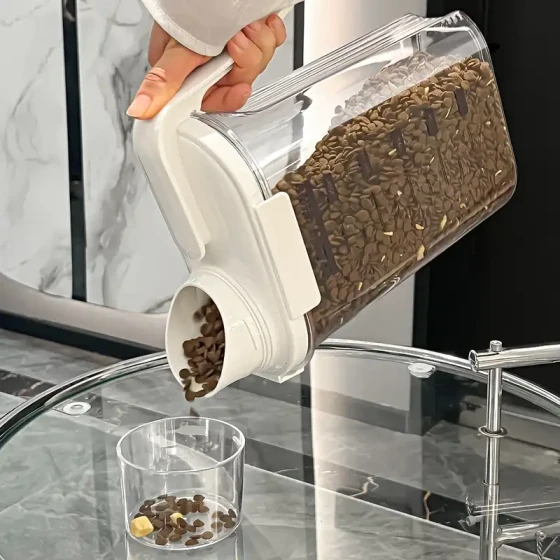Should 2-month-old kittens be dewormed_The necessity and best timing for kitten deworming
For two-month-old kittens, deworming is absolutely necessary and is a key step to ensure their healthy growth. At this stage, kittens have an immature immune system, making them highly susceptible to various internal and external parasites. Regular and scientific deworming can effectively prevent parasite-related health issues, helping them stay healthy and grow strong.

Kitten Deworming: Why Is It a "Must-Have"?
Raising kittens is like raising babies—they require meticulous care, and deworming is an indispensable item on this "love menu." You might wonder why two-month-old kittens must be dewormed? There are several important reasons behind this:
- High risk of "congenital infection": Many kittens become infected with parasites before or shortly after birth through their mother. For example, ascarid larvae can be transmitted through the placenta or mother's milk. This means even if your kitten has never gone outside, it may already be targeted by parasites. This is like the so-called risk of "bringing worms from the womb," and congenital infection risks cannot be ignored.
- Fragile immune defenses: At two months, kittens' body functions are still developing, especially their immune system, which is like a rookie soldier just beginning training and not yet strong. Once infected by parasites, they are more prone than adult cats to develop severe symptoms that may even threaten their lives.
- The "vampire" nature of parasites: Parasites, as the name implies, live on their hosts and steal nutrients from them as "uninvited guests." Internal parasites compete with kittens for nutrients, leading to poor appetite, malnutrition, weight loss, and dull coarse fur. Imagine if the food your kitten eats is consumed by these uninvited "roommates," how can they grow robustly?
- Potential zoonotic risks: Certain cat parasites, such as Toxoplasma gondii (though mainly transmitted via feces with complex infection routes) and fleas, pose potential threats to human health. Regular deworming protects not only the cat but also the family's health.
Best Timing and Frequency for Kitten Deworming
Deworming kittens is like fertilizing crops—it requires the right timing and conditions. Grasping the best timing and frequency can lead to twice the result with half the effort.
First Deworming: The Sooner the Better
Generally, kittens' first internal deworming can start at 2-3 weeks old. By this time, their bodies can generally tolerate the medication. After that, deworming should be done every 2-3 weeks until they are 3 months old.
Two-Month-Old Kittens: Peak Deworming Period
So, your two-month-old kitten is right in the intensive internal deworming phase. Usually, they should have had one or two doses already but still need to continue as per veterinarian recommendations to thoroughly eliminate internal parasites.
Kitten Deworming Reference Schedule (consult your vet for specifics):
Note: This is a general reference schedule. Each cat's situation differs, so be sure to consult a professional vet to develop the best deworming plan for your kitten.
Common Cat Parasites and Their "Mischievous" Symptoms
Knowing the parasite types and their symptoms helps you better judge whether your kitten needs deworming and assess its effectiveness afterward.
Internal Parasites
- Ascarids (Roundworms):
- Symptoms: Kittens have a rounded, bloated belly (commonly called "frog belly"), eat a lot but do not gain weight, and have rough, dull fur. In serious cases, vomiting may occur, and you might see thin, noodle-like live worms in the vomit or worms expelled in the feces.
- Characteristics: The most common parasites in kittens, transmitted via placenta or mother's milk.
- Tapeworms:
- Symptoms: White, rice-grain-sized segments appear in feces or around the anus, sometimes wiggling. Kittens may frequently drag their rear against surfaces due to anal itching (commonly known as "scooting").
- Characteristics: Usually infected by ingesting fleas carrying tapeworm larvae or raw meat.
- Hookworms:
- Symptoms: Kittens show anemia (pale gums and eyelids), poor appetite, weight loss, and black tarry stools (due to intestinal bleeding).
- Characteristics: Blood-sucking parasites causing significant harm to kittens.
- Coccidia:
- Symptoms: Persistent diarrhea, loose or bloody stool, dehydration. Kittens appear lethargic and have poor appetite.
- Characteristics: Common in kittens, especially in group housing or unhygienic conditions.
- Toxoplasma gondii:
- Symptoms: Most infected cats show no obvious signs; a few may have fever, loss of appetite, lethargy, hepatitis, pneumonia, or neurological symptoms. It poses potential risks to pregnant women and immunocompromised people.
- Characteristics: Complex infection routes; special attention needed for raw meat feeding and feces disposal.
External Parasites
- Fleas:
- Symptoms: Kittens scratch and bite their skin frequently, showing red patches, hair loss, and scabs. Black flea droppings (“flea dirt”) may be found deep in fur or when combing; these turn red upon contact with water.
- Characteristics: The most common external parasite, reproduces quickly and is an intermediate host for tapeworms.
- Mites:
- Symptoms: Vary by mite type. Ear mites cause dark brown discharge in the ear canal, with frequent scratching and head shaking; demodex or sarcoptic mites cause itching, redness, hair loss, and sometimes thick scabs.
- Characteristics: Typically transmitted through contact.
- Ticks:
- Symptoms: Blood-engorged ticks attached to the cat’s skin, usually on the head, ears, neck, or limbs, which can cause local inflammation or transmit diseases.
- Characteristics: Common in outdoor cats; feed heavily on blood.
Choosing Deworming Medication and Precautions
Selecting the correct dewormer and usage method is key to ensuring effectiveness and kitten safety.
- Choose kitten-specific medication: Do not randomly use adult cat dewormers or dog dewormers. Kittens’ liver and kidney functions are immature, and adult or dog dosages may cause poisoning. Always select products labeled "kitten-specific" with clear applicable ages or weights.
- Differentiating internal and external dewormers: Dewormers are classified as internal and external; some are combination products. External dewormers are usually spot-on or sprays applied to the skin (typically between the shoulder blades where cats can’t lick). Internal dewormers are usually oral tablets or liquids.
- Accurate dosing: Administer strictly according to instructions or vet guidance; less is better than more. Weighing the kitten helps ensure the correct dose.
- Observation before and after deworming: After deworming, mild gastrointestinal discomfort such as vomiting, diarrhea, or lethargy may occur temporarily. If symptoms are severe or persistent, contact your vet immediately.
- Fecal examination: A few days after deworming, observe kitten stools for dead or dying parasites, indicating the medicine is working.
- Environmental cleanliness: Alongside deworming, maintain hygiene by thoroughly cleaning the cat’s bed, litter box, and frequent areas to reduce parasite eggs or larvae and avoid reinfection.
Frequently Asked Questions
Q1: What happens if a 2-month-old kitten is not dewormed?
A1: Without deworming, a 2-month-old kitten is very likely to suffer from parasite infestation. Parasites steal nutrients causing malnutrition, stunted growth, lethargy, diarrhea, vomiting, and in serious cases, anemia or intestinal blockage that can be life-threatening. Some parasites may also infect humans.
Q2: Can kittens be bathed after deworming?
A2: It is generally recommended to wait 2-3 days after internal deworming until the medicine stabilizes and the kitten is in good condition before bathing. For external spot-on treatments, avoid bathing or water exposure for at least 24-48 hours to ensure efficacy. Refer to the medication instructions or consult your vet.
Q3: Can deworming products for kittens be bought casually at pet stores?
A3: When choosing dewormers, consult a professional veterinarian. Although some well-known products are available at pet stores, vets will recommend the most suitable medication and dosage based on your kitten’s age, weight, health status, and local parasite prevalence to avoid misuse or incorrect medication.
Q4: How to know if a kitten has parasites?
A4: The most accurate method is to take the kitten to a veterinary clinic for fecal examination. The vet will microscopically check for parasite eggs in the stool sample. You can also observe symptoms like diarrhea, vomiting, weight loss, bloated belly, rough fur, anal itching, or visible worms in feces.
Summary
Kitten deworming is one of the essential "hard skills" every new cat owner must master. For two-month-old kittens, deworming is urgent. Like watering and fertilizing a young sapling, regular, scientific deworming helps clear internal and external "pests," safeguarding their healthy growth. Always consult a professional vet to create a personalized deworming plan and strictly follow medical advice. After all, no cat owner wants their kitten to be anything less than healthy, lively, shiny-coated, and adorably "chubby."
References
According to information published by the American Association of Feline Practitioners (AAFP), kittens are more susceptible to parasites due to immature immune systems, and parasite infections seriously affect their growth and health.
The World Organisation for Animal Health (WOAH) reminds that some pet parasites carry zoonotic risks, such as Toxoplasma gondii and fleas, so regular deworming is part of public health protection.
Cornell Feline Health Center suggests kitten deworming plans start at 2-3 weeks of age and continue according to specific conditions and vet advice.
Veterinary Internal Medicine notes ascarid infections are common digestive parasites in kittens, with typical symptoms including abdominal distension and vomiting worms.
The British Small Animal Veterinary Association (BSAVA) clinical guidelines mention the characteristic symptom of tapeworm infection is rice-grain-sized segments found in feces or around the anus.
Veterinary parasitology textbooks describe hookworms as a major cause of anemia and black stools in puppies and kittens.
The American Animal Hospital Association (AAHA) points out coccidiosis often causes persistent diarrhea in young animals, especially in crowded or unsanitary conditions.
The World Health Organization (WHO) toxoplasmosis report emphasizes potential risks to immunocompromised individuals and pregnant women and identifies cats as the primary host.
The Merck Veterinary Manual details clinical symptoms of flea infestations, including itching, dermatitis, and finding flea dirt.
Feline Medicine describes different mite infections, such as ear and sarcoptic mites, causing typical skin symptoms in cats.



-560x560.webp)

